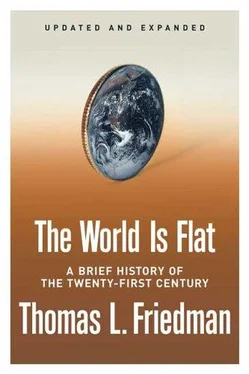The fall of the Berlin Wall on 11/9/89 unleashed forces that ultimately liberated all the captive peoples of the Soviet Empire. But it actually did so much more. It tipped the balance of power across the world toward those advocating democratic, consensual, free-market-oriented governance, and away from those advocating authoritarian rule with centrally planned economies. The Cold War had been a struggle between two economic systems-capitalism and communism-and with the fall of the wall, there was only one system left and everyone had to orient himself or herself to it one way or another. Henceforth, more and more economies would be governed from the ground up, by the interests, demands, and aspirations of the people, rather than from the top down, by the interests of some narrow ruling clique. Within two years, there was no Soviet Empire to hide behind anymore or to prop up autocratic regimes in Asia, the Middle East, Africa, or Latin America. If you were not a democracy or a democratizing society, if you continued to hold fast to highly regulated or centrally planned economics, you were seen as being on the wrong side of history.
For some, particularly among the older generations, this was an unwelcome transformation. Communism was a great system for making people equally poor. In fact, there was no better system in the world for that than communism. Capitalism made people unequally rich, and for some who were used to the plodding, limited, but secure Socialist lifestyle-where a job, a house, an education, and a pension were all guaranteed, even if they were meager-the fall of the Berlin Wall was deeply unsettling. But for many others, it was a get-out-of-jail-free card. That is why the fall of the Berlin Wall was felt in so many more places than just Berlin, and why its fall was such a world-flattening event.
Indeed, to appreciate the far-reaching flattening effects of the fall of the Berlin Wall, it's always best to talk to non-Germans or non-Russians. Tarun Das was heading the Confederation of Indian Industry when the wall fell in Berlin, and he saw its ripple effect felt all the way to India. “We had this huge mass of regulation and controls and bureaucracy,” he recalled. “Nehru had come to power [after the end of British colonial rule] and had a huge country to manage, and no experience of running a country. The U.S. was busy with Europe and Japan and the Marshall Plan. So Nehru looked north, across the Himalayas, and sent his team of economists to Moscow. They came back and said that this country [the Soviet Union] was amazing. They allocate resources, they give licenses, there is a planning commission that decides everything, and the country moves. So we took that model and forgot that we had a private sector... That private sector got put under this wall of regulation. By 1991, the private sector was there, but under wraps, and there was mistrust about business. They made profits! The entire infrastructure from 1947 to 1991 was government-owned... [The burden of state ownership] almost bankrupted the country. We were not able to pay our debts. As a people, we did not have self-confidence. Sure, we might have won a couple of wars with Pakistan, but that did not give the nation confidence.”
In 1991, with India running out of hard currency, Manmohan Singh, the finance minister at that time (and now the prime minister), decided that India had to open its economy. “Our Berlin Wall fell,” said Das, “and it was like unleashing a caged tiger. Trade controls were abolished. We were always at 3 percent growth, the so-called Hindu rate of growth-slow, cautious, and conservative. To make [better returns], you had to go to America. Well, three years later [after the 1991 reforms] we were at 7 percent rate of growth. To hell with poverty! Now to make it you could stay in India and become one of Forbes's richest people in the world... All the years of socialism and controls had taken us downhill to the point where we had only $1 billion in foreign currency. Today we have $ 118 billion... We went from quiet self-confidence to outrageous ambition in a decade.”
The fall of the Berlin Wall didn't just help flatten the alternatives to free-market capitalism and unlock enormous pent-up energies for hundreds of millions of people in places like India, Brazil, China, and the former Soviet Empire. It also allowed us to think about the world differently-to see it as more of a seamless whole. Because the Berlin Wall was not only blocking our way; it was blocking our sight-our ability to think about the world as a single market, a single ecosystem, and a single community. Before 1989, you could have an Eastern policy or a Western policy, but it was hard to think about having a “global” policy. Amartya Sen, the Nobel Prize-winning Indian economist now teaching at Harvard, once remarked to me that “the Berlin Wall was not only a symbol of keeping people inside East Germany-it was a way of preventing a kind of global view of our future. We could not think globally about the world when the Berlin Wall was there. We could not think about the world as a whole.” There is a lovely story in Sanskrit, Sen added, about a frog that is born in a well and stays in the well and lives its entire life in the well. “It has a worldview that consists of the well,” he said. “That was what the world was like for many people on the planet before the fall of the wall. When it fell, it was like the frog in the well was suddenly able to communicate with frogs in all the other wells... If I celebrate the fall of the wall, it is because I am convinced of how much we can learn from each other. Most knowledge is learning from the other across the border.”
Yes, the world became a better place to live in after 11/9, because each outbreak of freedom stimulated another outbreak, and that process in and of itself had a flattening effect across societies, strengthening those below and weakening those above. “Women's freedom,” noted Sen, citing just one example, “which promotes women's literacy, tends to reduce fertility and child mortality and increase the employment opportunities for women, which then affects the political dialogue and gives women the opportunity for a greater role in local self-government.”
Finally, the fall of the wall did not just open the way for more people to tap into one another's knowledge pools. It also paved the way for the adoption of common standards-standards on how economies should be run, on how accounting should be done, on how banking should be conducted, on how PCs should be made, and on how economics papers should be written. I discuss this more later, but suffice it to say here that common standards create a flatter, more level playing field. To put it another way, the fall of the wall enhanced the free movement of best practices. When an economic or technological standard emerged and proved itself on the world stage, it was much more quickly adopted after the wall was out of the way. In Europe alone, the fall of the wall opened the way for the formation of the European Union and its expansion from fifteen to twenty-five countries. That, in combination with the advent of the euro as a common currency, has created a single economic zone out of a region once divided by an Iron Curtain.
While the positive effects of the wall coming down were immediately apparent, the cause of the wall's fall was not so clear. There was no single cause. To some degree the termites just ate away at the foundations of the Soviet Union, which were already weakened by the system's own internal contradictions and inefficiencies; to some degree the Reagan administration's military buildup in Europe forced the Kremlin to bankrupt itself paying for warheads; and to some degree Mikhail Gorbachev's hapless efforts to reform something that was unreformable brought communism to an end. But if I had to point to one factor as first among equals, it was the information revolution that began in the early— to mid-1980s. Totalitarian systems depend on a monopoly of information and force, and too much information started to slip through the Iron Curtain, thanks to the spread of fax machines, telephones, and other modern tools of communication.
Читать дальше












